February 15, 2024
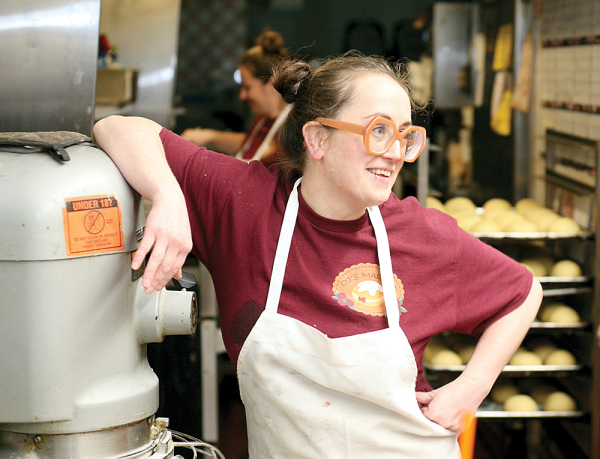
Dawn Morris, part of the third generation at DJ’s Market, took on the role of making the Paczki donuts about 10 years ago, and now has made it the hub of activity for the popular store on Fat Thursday and Fat Tuesday. She and her crew churn out about 1,000 donuts overnight for both days. Seth Daniel photo
The clock in the kitchen at DJ’s European Market and Deli at 120 Boston St. in the Polish Triangle reads nearly 2 a.m., when the kitchen is usually dark, silent, and waiting on normal morning routines.
But last Thursday (Feb. 8) – known as Fat Thursday in the Polish tradition - and Tuesday of this week (Feb. 13) – known as Fat Tuesday in the American tradition – were not normal nights at DJ’s, the family-owned business that has become the hub of the Polish donut, known as a Paczki (pronounced punch-key), bolstered by the talents of third-generation baker Dawn Morris.
At 2 a.m. on those two days, the lights are on, and the mixer is churning Paczki dough in the rush to finish 1,000 donuts before 8 a.m. when lines have already formed outside the door as people of all stripes wait to partake in a tradition – whether Polish Fat Thursday or American Fat Tuesday.
“We open at 8 a.m. and they start going out the door at 8 a.m.,” said Morris. “We like to have the orders ready, so it becomes a rush from 5 a.m. to opening – even though we’re here all night long. We even have our groups that come early like this Polish guy who comes at 4 a.m. He starts work early and stops by to get them so that he can share with his co-workers.”
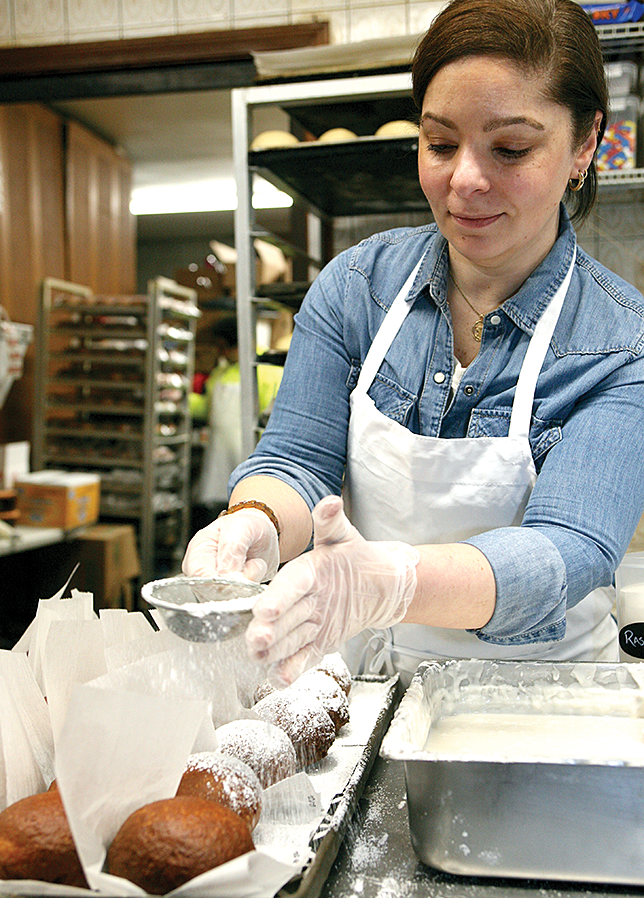
Laura Cutone dusts powdered sugar on top of some of the plum Paczkis during the overnight last Thursday.
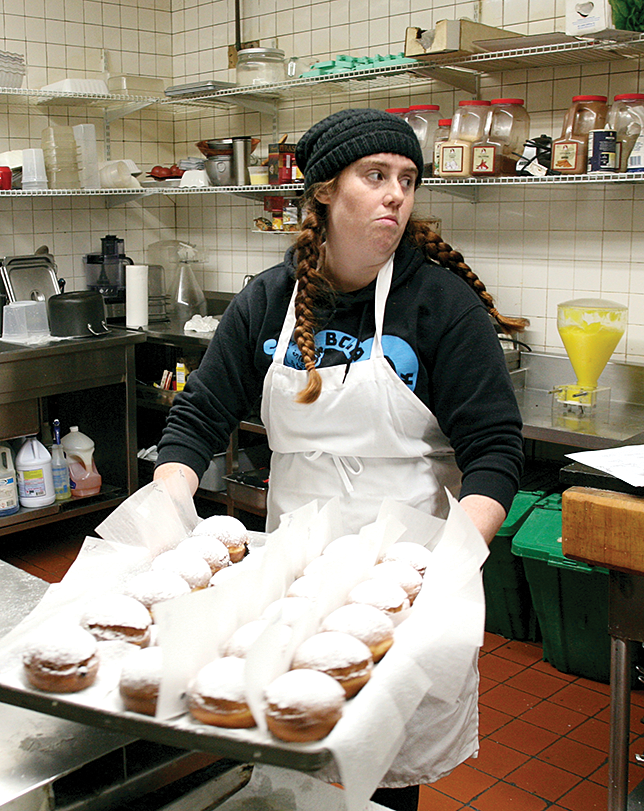
Kellie Hurley takes a tray of finished raspberry Paczkis to the back room to box up and get ready for customers. Seth Daniel photos
DJ’s has been in the family since the1970s, when Gino and Theresa Jurczuk operated the Polish-themed market, one of several in the Triangle at the time. Their daughter, Alina Morris, and her husband Danny later purchased the store and have been stalwarts behind the counter for decades. Now, they’ve brought their daughters, Alina ‘Jackie’ Morris and Dawn Morris, into the fold as the third generation.
The store was named as a Legacy Business by the City of Boston last year, and while it’s known far and wide for Alina’s kielbasa macaroni, cheese and beef stew, and its traditional Polish sandwiches, the magic of the place is amplified by homemade items like the Paczki.
“There are some other people that have them, but we’re the only ones that make them homemade here in the Polish Triangle,” said Jackie. “It’s special because we make them fresh, not just for these special occasions, but every day. Most everyone else has them shipped in frozen from western Massachusetts.”
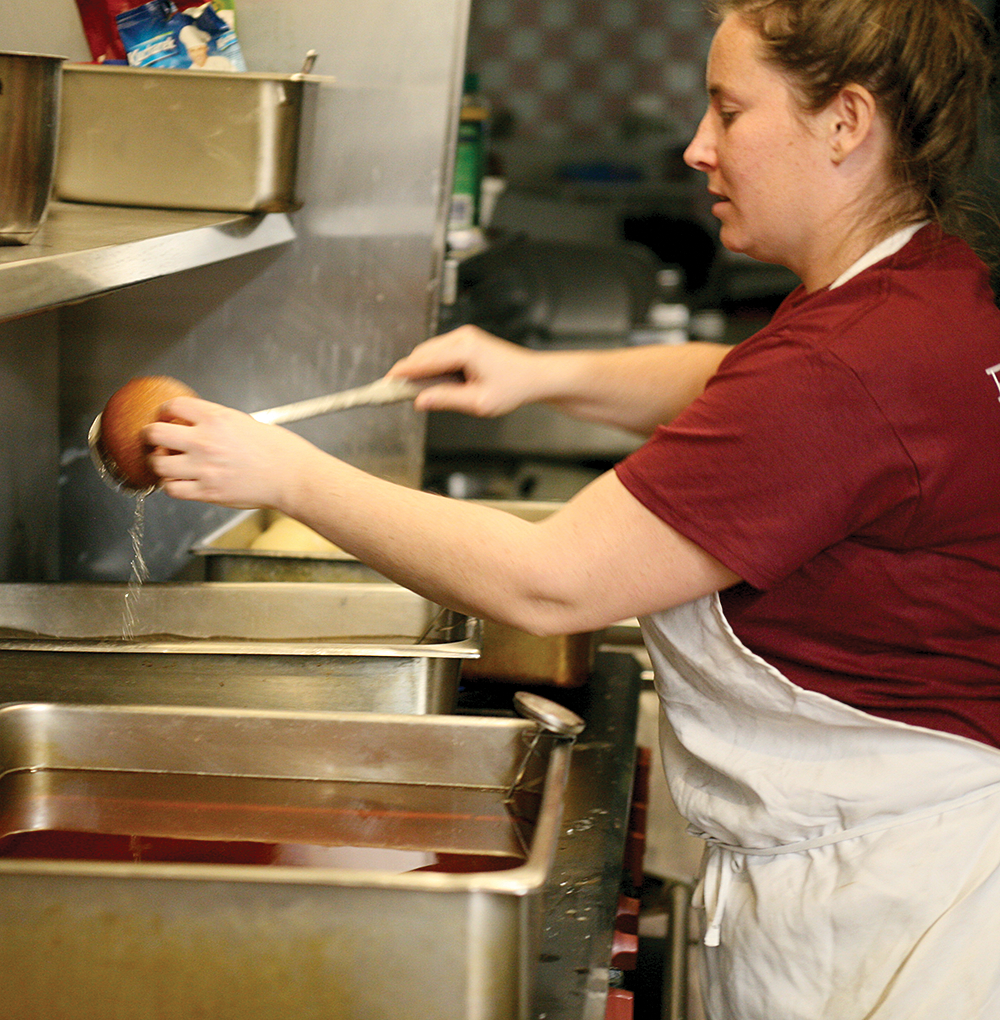
Sue-Ellen Duffy removes one of the Paczkis from the hot oil.
She said the tradition of making them at DJ’s began when her mom was laid off from her job in the 1970s after becoming pregnant with her first child – a common thing that happened to women back then, she noted.
“My grandparents owned the deli and to make extra money my mom started making Paczkis,” she said. “She would sell them in the store, and we’ve had them in some form ever since.”
Dawn said that the two ‘Paczki Days’ and Easter Sunday have become their busiest times and people expect the delectable donuts each year before Lent starts in the Roman Catholic tradition.
“There’s really a Paczki buzz going on, and it’s become a busier time in the store,” she said. “We talk about it in the store and people who don’t even celebrate the holiday will put in orders. We love that so many are showing love to the Paczki. But a lot of people also don’t know we make them year-round. Even in July, you can get a Paczki here.”
Dawn grew up in a three-decker in the Polish Triangle and still lives there with family, waking up most days at 4 a.m. and walking to work to begin baking. She attended college for theatre arts but then discovered a love for baking and custom cakes. She pivoted, graduated from Le Cordon Bleu Academy in Cambridge, worked a stint making pastries in the North End, and then returned to the family business “assuming the role of Paczki maker” about 10 years ago.
However, things really took off when she did research and found that Fat Thursday is a big holiday in Poland, where it is observed on the Thursday before Ash Wednesday, the first day of Lent, unlike in America where Fat Tuesday (“Mardi Gras” in French) occurs on the day before the 40-day stretch of Lenten fasting and abstinence begins.
Dawn and her sister promoted the holiday, and the Paczkis, on social media and in other venues and saw excitement gather at the market on both days as a result. An old European tradition was headed for a revival.
“I think it’s a really old thing that goes back a long time, when people wanted to use up the last of the lard and the sugar because no one would be using them during Lent,” she said. “One easy thing to do is make these Polish donuts. They use lard, milk, and sugar. It was a way to use it up and then it became more of a tradition and people ate them for good luck.”
The process of getting them into people’s hands is just as interesting as having them eating the finished product. Dawn and a crew of about five other die-hard helpers assemble every year around 9 p.m. on Wednesday night for Fat Thursday, and Monday night for Fat Tuesday. The kitchen picks up about 11 p.m., making dough, shaping Paczkis, frying them, then filling and finishing them.
Outside in the night, cars go by intermittently on Boston Street, and the occasional pedestrian walks by. Mostly, it’s the kind of quiet that most people sleep through, the language of late night and the wee hours in Boston that can be heard in the low roar of the Expressway and the subtle hum of a city mostly at rest. Inside the market, though, the sounds of the mixer, the bubbling of the oil, and the patter of footsteps carrying trays back and forth, speak to the urgent business at hand.
The most traditional flavor is rose, a jelly that is popular in Poland, said Dawn. The biggest seller, though, is raspberry, followed by lemon and plum. However, Dawn has added some new twists: buttercreams with coffee mocha, maple bacon, and Nutella flavoring. “I’ve even done the Boston Crème version of a Paczki,” she said, laughing.
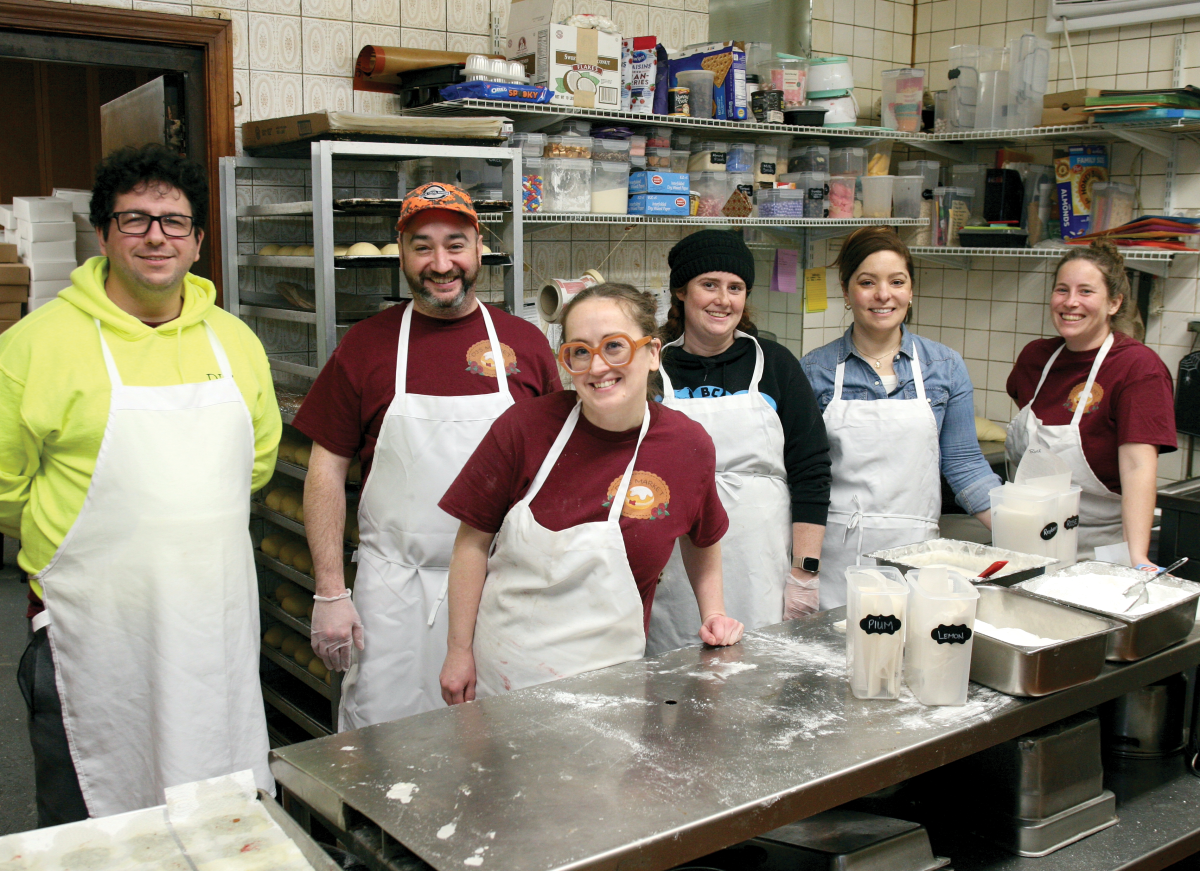
The Paczki Crew in the kitchen at DJ’s Market takes time out from making the traditional Polish donuts for a photo – sometime just after 2 a.m. From left, James Szalwinski, Kyle Sunter, Chief Baker Dawn Morris, Laura Cutone, Kellie Hurley, and Sue-Ellen Duffy.
There is no recipe written down, she said. Those baking them over the years just had the know-how and adapted it to their liking. But one constant has been that they are hand-made, the bakers taking extra time overnight to do things the traditional way.
“I don’t think anyone else is crazy enough to do it this old-fashioned way because it’s a more tedious process, but I think people appreciate not having to settle for a supermarket Paczki,” said Dawn. “I’ve had people from Poland say these are better than the ones in Poland. It feels good when people appreciate the extra work it takes.”



